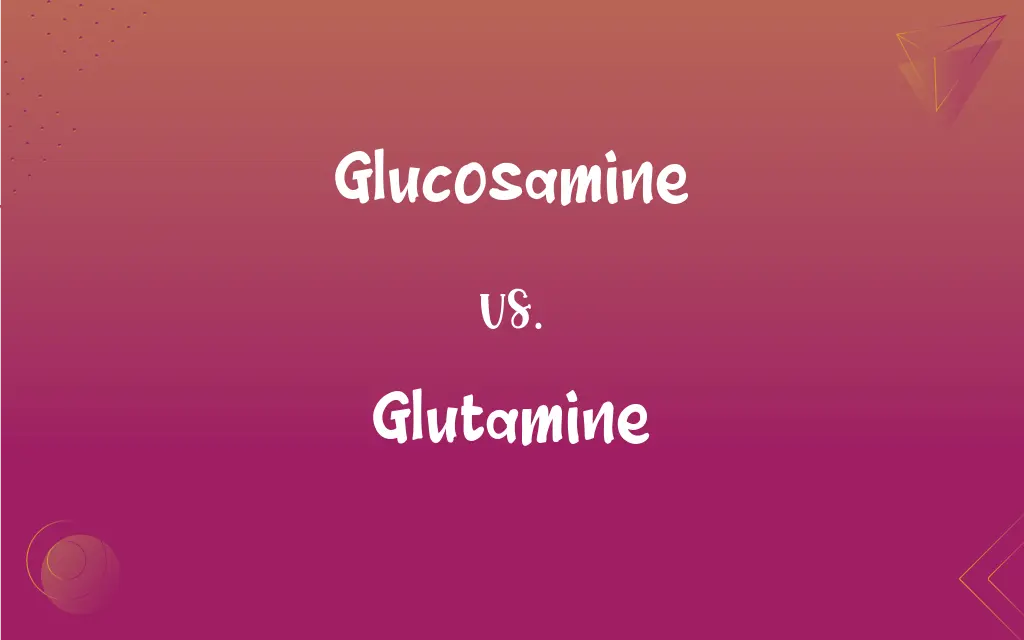Glucosamine vs. Glutamine: What's the Difference?
Edited by Harlon Moss || By Janet White || Published on January 26, 2024
Glucosamine is a natural compound found in cartilage, while glutamine is an amino acid important for immune function and gut health.

Key Differences
Glucosamine is a natural substance found in the body, primarily in cartilage, known for its role in joint health and osteoarthritis management. On the other hand, Glutamine, an amino acid, is crucial in protein synthesis, immune system function, and intestinal health.
Glucosamine is often sourced from shellfish shells or synthesized in laboratories for dietary supplements aimed at joint support. Contrastingly, Glutamine is abundant in foods like meat, eggs, and dairy, serving as a building block for proteins and a critical fuel source for immune cells.
In the context of dietary supplements, glucosamine is frequently combined with chondroitin for enhanced joint support, reflecting its role in cartilage repair and maintenance. Glutamine, however, is often recommended for muscle recovery post-exercise and for supporting gut barrier functions.
The therapeutic use of glucosamine often focuses on reducing joint pain and slowing the progression of joint degeneration, particularly in osteoarthritis. Glutamine, conversely, is used in clinical settings to aid in recovery from surgeries, injuries, and infections, emphasizing its role in immune response and tissue repair.
Glucosamine supplements are typically recommended for older adults experiencing joint issues, while glutamine supplements are more versatile, being used by athletes for recovery, patients for immune support, and individuals with gastrointestinal issues.
ADVERTISEMENT
Comparison Chart
Primary Function
Joint health and cartilage maintenance
Protein synthesis and immune support
Common Uses
Osteoarthritis management, joint pain relief
Muscle recovery, gut health, immune system boosting
Source
Shellfish shells, laboratory synthesis
Meat, eggs, dairy products
Therapeutic Focus
Reducing joint degeneration, pain management
Recovery from surgery, injury, boosting immune function
Target Demographic
Often older adults with joint issues
Athletes, patients in recovery, individuals with gut issues
ADVERTISEMENT
Glucosamine and Glutamine Definitions
Glucosamine
Glucosamine is a natural compound in human cartilage.
Doctors often recommend glucosamine supplements for osteoarthritis.
Glutamine
Glutamine is an amino acid vital for immune and digestive health.
Post-surgery, glutamine supplements helped strengthen my immune system.
Glucosamine
It's a key ingredient in joint health supplements.
Glucosamine, combined with chondroitin, is effective for joint pain.
Glutamine
It supports muscle growth and recovery.
Athletes often use glutamine to aid muscle recovery after intense workouts.
Glucosamine
Glucosamine aids in the building and repair of cartilage.
After my knee injury, I started taking glucosamine to help rebuild cartilage.
Glutamine
Glutamine is essential for protein synthesis in the body.
To support my bodybuilding goals, I include glutamine in my diet.
Glucosamine
It's often derived from shellfish for supplements.
Check if your glucosamine supplement is shellfish-based if you have allergies.
Glutamine
Glutamine can speed up recovery after injury or illness.
Taking glutamine supplements accelerated my recovery from the flu.
Glucosamine
Glucosamine can alleviate symptoms of joint disorders.
Glucosamine has significantly reduced my knee pain.
Glutamine
It's found in foods like beef, eggs, and dairy.
My diet rich in glutamine, including eggs and milk, helps maintain my gut health.
Glucosamine
An amino derivative of glucose, C6H13NO5, in which an amino group replaces a hydroxyl group. It is a component of many polysaccharides and the basic structural unit of chitin, and is used as an over-the-counter dietary supplement alone or in combination with chondroitin for treatment of joint pain in arthritis.
Glutamine
A nonessential amino acid, C5H10N2O3, occurring widely in plant and animal tissue and proteins and produced commercially for use in medicine and biochemical research.
Glucosamine
(biochemistry) An amino derivative of glucose that is a component of polysaccharides such as chitin; it is marketed as a dietary supplement supposedly to reduce the symptoms of arthritis.
Glutamine
(amino acid) A nonessential amino acid C5H10N2O3 found in most animal and plant proteins.
Glutamine
A crystalline amino acid occurring in proteins; important in protein metabolism
FAQs
Does glutamine boost the immune system?
Yes, it plays a vital role in immune function.
What is glucosamine used for?
It's used for joint health and osteoarthritis management.
Can glutamine help with muscle recovery?
Yes, it's often used for muscle recovery post-exercise.
Are there any common side effects of glucosamine?
Mild gastrointestinal upset and allergies to shellfish sources.
Is glutamine important for athletes?
Yes, it's crucial for muscle repair and recovery in athletes.
Is glucosamine safe for long-term use?
Generally yes, but consult a doctor for individual advice.
Is glucosamine derived from animals?
Yes, it's commonly sourced from shellfish shells.
Can glutamine help in weight loss?
It's not directly linked to weight loss but supports muscle metabolism.
Can glucosamine be taken with other medications?
Consult a healthcare provider due to potential interactions.
Are there vegetarian sources of glucosamine?
Yes, some supplements are made from fermented corn.
Does glutamine have any cognitive benefits?
Some research suggests it may support brain health.
Can glucosamine cause allergic reactions?
Yes, especially in individuals allergic to shellfish.
Is glutamine effective for post-surgery recovery?
Yes, it's often used to aid recovery and immune function post-surgery.
Can glucosamine help with knee pain?
Yes, it's often recommended for joint pain relief.
How does glucosamine interact with cartilage?
It aids in the repair and formation of cartilage.
Can glutamine supplements cause side effects?
Possible side effects include gastrointestinal upset in high doses.
How does glutamine support gut health?
It helps maintain the integrity of the intestinal lining.
What are natural food sources of glutamine?
Meat, dairy, and eggs are rich in glutamine.
What is the recommended dosage for glucosamine?
Typically, 1500 mg per day, but consult a healthcare provider.
Is glutamine beneficial for people with digestive issues?
Yes, it can aid in gut health and recovery.
About Author
Written by
Janet WhiteJanet White has been an esteemed writer and blogger for Difference Wiki. Holding a Master's degree in Science and Medical Journalism from the prestigious Boston University, she has consistently demonstrated her expertise and passion for her field. When she's not immersed in her work, Janet relishes her time exercising, delving into a good book, and cherishing moments with friends and family.
Edited by
Harlon MossHarlon is a seasoned quality moderator and accomplished content writer for Difference Wiki. An alumnus of the prestigious University of California, he earned his degree in Computer Science. Leveraging his academic background, Harlon brings a meticulous and informed perspective to his work, ensuring content accuracy and excellence.































































